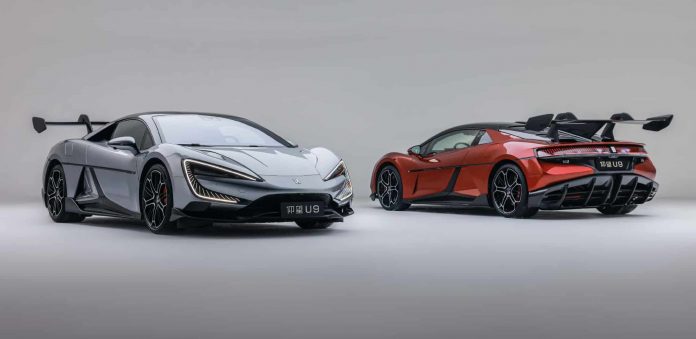China-based car manufacturer BYD has revealed new details and a launch timeline for its new premium electric “supercar,” the U9, which it claims can compete with luxury sports models from brands like Ferrari in terms of speed.
BYD luxury brand Yangwang will launch the performance-focused model this summer with a starting price of $233,424. The subsidiary has two other electric vehicles in its lineup, the U8 SUV and the still-unreleased U7 sedan. The U9 was teased during the company’s U8 showcase in January 2023, at which time it said the starting price would be above $145,340.
BYD says the new model is capable of reaching top speeds of just over 192 miles per hour (mph). While the fastest Ferrari, the FXX Evo, easily outpaces the U9 with a maximum speed of 249 mph, the upcoming Yangwang vehicle is comparable to other models from the Italian luxury sports car maker, such as the Monza SP2 (186 mph) or Scuderia Spider 16M (196 mph).
Over the last three decades, the Chinese automaker has steadily increased its competitiveness with long-established manufacturers. In 2022, the brand opted to cease production of internal combustion engine models to prioritize hybrid and all-electric vehicles. BYD surpassed its primary rival in the battery-powered car segment, Tesla, for the first time last year in both production and sales, although the U.S. company does not sell hybrids. On an electric-only basis, BYD fell roughly 240,000 units short of Tesla’s 1.84 million unit production total and 210,000 short of its 1.81 million unit sales total.
Nevertheless, BYD is continuing to establish itself as a global competitor in the electric vehicle space, one which other companies can ill afford to ignore. The loss of market share in China has inspired some brands, such as Volkswagen and Stellantis, to join forces in the hopes of addressing the threat posed by the country’s domestic car manufacturers. Unfortunately for them, those efforts may be hindered by those companies’ longstanding reticence to take the electric vehicle segment seriously. China accounts for roughly 60% of the globe’s battery-powered car sales, although only 26% of their domestic market in 2023 was comprised of electric vehicles. As such, it will likely be an uphill battle to beat BYD in its home market, especially as it continues to branch out into new segments with competitive entrants such as the U9.



